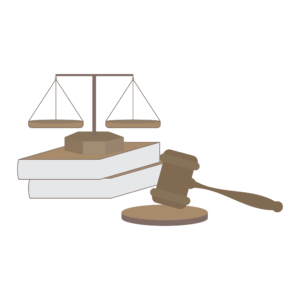The Criminal Court Process
The criminal court process can be confusing to anyone who has not had prior contact with the criminal justice system. Below is a simplified discussion to help explain the major stages of the criminal court process.
Complaint Phase
If you discover or have reason to believe you are the victim of a crime, your first call should be to 9-1-1 (if the crime is in progress), or to your local police department (if the crime has already occurred). A police officer will either respond to the scene of the alleged crime or ask you to come to the police station to file a police report. There also are instances in which a police officer may observe a potential crime in progress and begin an investigation on his or her own.
Investigation Phase
Depending on each case, after a police officer has taken the preliminary report, officers known as detectives and not usually in uniform begin the investigative phase. Depending on the alleged crime, this phase can range from interviewing suspects and reviewing physical evidence, to requiring the use of grand jury subpoenas for testimony, documents, and reports. In some instances, an investigation may require detailed forensic analysis from a crime laboratory. As the investigation progresses, it may become evident that while a person or persons have been victimized by someone else’s conduct, no crime may actually have occurred. In such cases, although the criminal justice system may not be able to provide a remedy for the victim, the victim may have civil causes of action available to him or her and may elect to retain an attorney to sue the wrongdoer. The State’s Attorney’s Office cannot assist victims of civil torts or negligence with their litigation.
Charging Phase
When an investigation progresses to the point that the police have probable cause — that is, a reasonable belief that a person has committed a crime — they may make an arrest. An important part of this phase is the determination of what offense or offenses have been committed. Some conduct can be charged in a variety of ways. For example, depending on the facts, a Driving Under the Influence case can be charged as either a misdemeanor violation of the state law or of a city or village’s municipal code, or prosecuted as a felony offense under state law. If the police officer determines the matter should be charged as a misdemeanor violation of state law, then the case will be prosecuted by the State’s Attorney’s Office. This decision usually is based on the general orders adopted by a particular police department.
On the other hand, if the police officer believes that felony charges may be appropriate, he or she must contact an on-call Assistant State’s Attorney who will review the case and make the ultimate decision on whether to file a felony charge. If the Assistant State’s Attorney determines that a felony is not warranted, misdemeanor charges can still be filed.
Bond Court Phase
Once the suspect is charged with a criminal complaint, he or she becomes the defendant in the criminal case and may be eligible to be released on bond. In most misdemeanor cases, other than domestic violence, a defendant’s bond is set by judicial rule and if he or she is able to post the required amount of bail, he or she can be released until the initial court date. If the defendant cannot post bond or is charged with a serious criminal offense, he or she will be taken to the Will County Jail and appear before a judge for a bond hearing within 48 hours (usually 24) of arrest. The bond court judge then determines the appropriate level of bail. The amount of bail a judge sets should be appropriate to protect the public and to assure the defendant’s appearance in court. It is not punishment for the alleged offense.
Pre-Trial Phase
As bail is set, the circuit clerk will assign each new criminal case to a courtroom and set a date for the defendant’s arraignment. This date usually is about 30 days from the date of the arrest. Between the arrest and arraignment, the State’s Attorney will assign an Assistant State’s Attorney, or ASA, to prosecute the case on behalf of the People of the State of Illinois. Once assigned, the ASA, will begin to gather police reports and other documents related to the case.
If the crime alleged is a felony, the ASA will prepare a draft indictment for presentation to the Grand Jury. The Grand Jury proceeding is an essential constitutional protection for an accused and provides the opportunity for an impartial tribunal, in the form of the 18 grand jurors who determine whether there is sufficient evidence to determine a crime has been committed and whether there are reasonable grounds to believe the alleged offender committed the crime. This process may also be accomplished by way of a preliminary hearing before a judge.
On the Defendant’s initial court date, the judge assigned to the case will formally arraign the defendant by notifying him or her of the pending charges and penalties. The judge will also inform the defendant of his or her constitutional and statutory rights. If appropriate, the judge will also consider appointing a public defender to represent the defendant.
The case next enters the discovery phase where both the assigned Assistant State’s Attorney and the defense attorney collect the evidence in the case and prepare for trial. Police reports, medical examiner reports, lab results, fingerprint tests, gunpowder tests, blood samples, hospital reports, photographs, and other evidence is collected and reviewed. Pursuant to law, both the State and the defense must comply with the rules of discovery. A series of court dates are set by a judge in order to determine that the case progresses in a timely fashion. During the discovery phase, the defense or the state may file pre-trial motions regarding the admission of evidence at the trial and all pre-trial motions have been heard.
Eventually, once discovery appears complete, the judge will set a trial date and the ASA prepares the case for trial. The discovery obligations for prosecutors, however, continue as new information comes to light.
Trial Phase
The defendant has the option of a bench trial (without a jury), or a jury trial. During the trial, both sides have the opportunity to call and cross-examine witnesses. If, following the trial, the defendant is found guilty of a felony offense, the judge will order a Pre-Sentence Report to be prepared by the Probation Department and schedule a sentencing. A Pre-Sentence Report details the specifics of the crime and provides a detailed history of the defendant.
Sentencing Phase
At the sentencing hearing, the ASA will argue for an appropriate sentence and may introduce evidence of past criminal involvement. Depending on the crime, the ASA also may ask a victim to read a Victim Impact Statement detailing how this crime affected the individual. The defense will argue for what they believe is an appropriate sentence and may introduce evidence into mitigation. After these arguments are complete, the judge imposes the sentence he or she feels is just.
Things to Remember
This summary tries to provide a sequential explanation of the different phases of a criminal prosecution, but in many respects these phases often overlap. For example, the investigative phase often should continue even after an arrest is made. There may be additional witnesses with information relevant to the case that were not known at the time the initial charging decision was made or physical evidence that was not immediately discovered. It is important to remember that the police and prosecutors are in the business of doing justice and that often means going to extraordinary lengths to explore all potential leads.
Similarly, prosecutors have a continuing duty to turn over relevant information to the defense as it becomes known to them. Even if a trial is already in progress, the prosecution must turn over all information is material to the defendant’s guilt or innocence, or to the punishment of a defendant, to the defense.
And finally, although the interests of victims of crime are extremely important, the Office of the State’s Attorney represents all the people of the county, not individual victims. Once the case is charged, the State’s Attorney has absolute discretion over how to proceed, if at all, with the prosecution. Though it will always take into consideration the wishes of a victim, only the State’s Attorney’s Office has the authority to decide to “drop the charges.” This means that in most cases, once a prosecution has been initiated it will not be dismissed at the request of the complaining victim, unless injustice would result from the continued prosecution.

